The Samsung SSD 830 Review
by Anand Lal Shimpi on September 24, 2011 1:02 AM EST- Posted in
- SSDs
- Storage
- Samsung
- pm830
- Samsung SSD 830
AnandTech Storage Bench 2011 - Light Workload
Our new light workload actually has more write operations than read operations. The split is as follows: 372,630 reads and 459,709 writes. The relatively close read/write ratio does better mimic a typical light workload (although even lighter workloads would be far more read centric).
The I/O breakdown is similar to the heavy workload at small IOs, however you'll notice that there are far fewer large IO transfers:
| AnandTech Storage Bench 2011 - Light Workload IO Breakdown | ||||
| IO Size | % of Total | |||
| 4KB | 27% | |||
| 16KB | 8% | |||
| 32KB | 6% | |||
| 64KB | 5% | |||
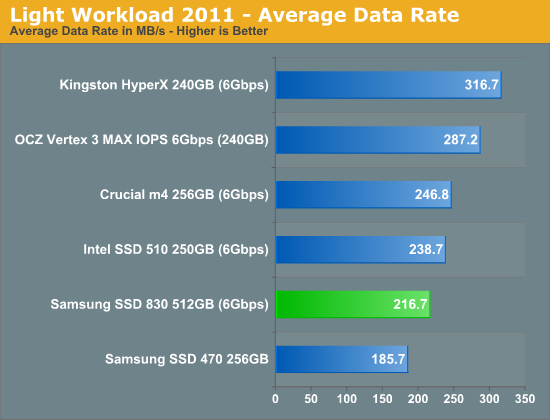
For lighter workloads that involve far less incompressible data, the 830 takes a clear backseat to the SF-2281 based drives. For nearly all users SandForce's real-time compression/dedupe architecture is a significant boon. You simply can't outperform a well designed controller that just writes less than the competition. The SSD 830 is at least significantly faster than the 470 and within striking distance (~10%) of the Intel SSD 510 and Crucial m4.
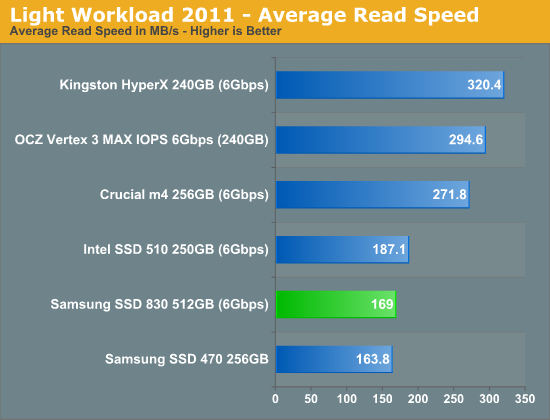
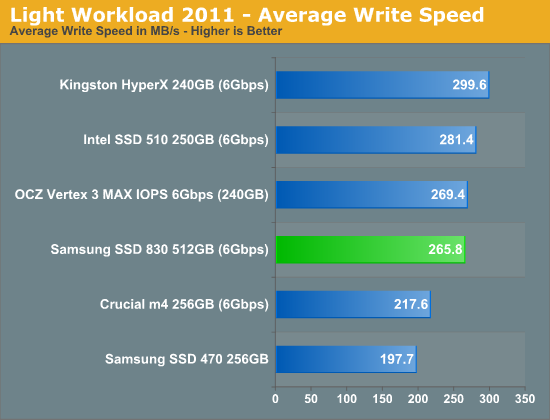
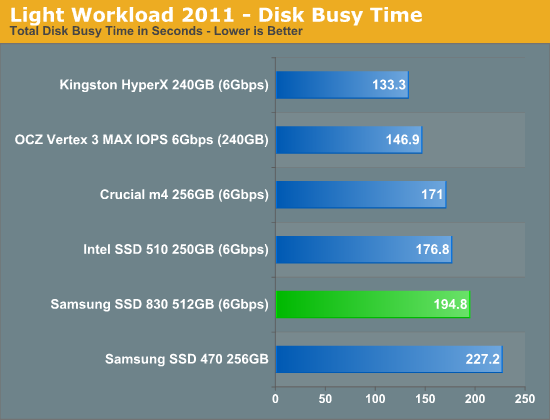
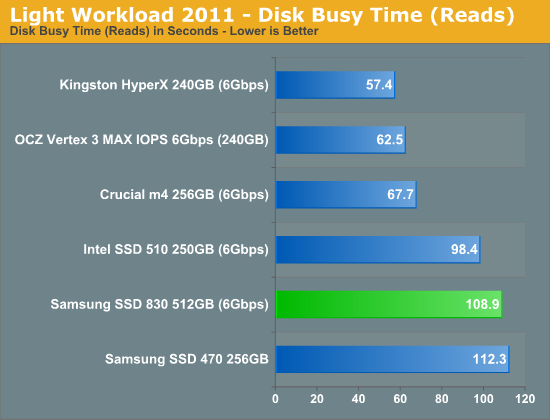
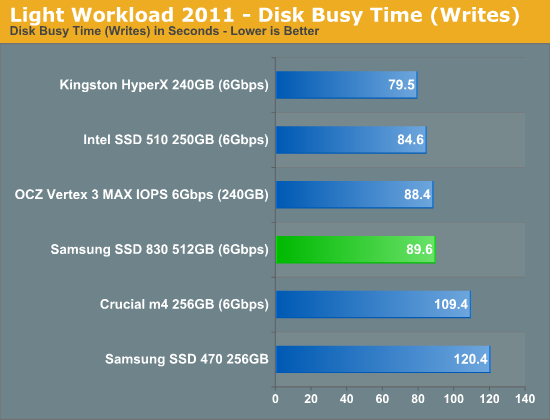










99 Comments
View All Comments
johan851 - Saturday, September 24, 2011 - link
Great article! I'm a little curious, though, as to why you prefer a drive to garbage collect in real time rather than cleaning up after the fact. While I think I sympathize with the idea of improving worst-case performance at the expense of the average, which essentially gives users a less bumpy ride, aren't most typical desktop usage scenarios full of idle disk time?I like the emphasis on Anandtech on what actually matters in real world scenarios, but it seems that your complaint on this particular matter is very much the opposite. The typical desktop user isn't going to fill the drive with writes and then immediately demand super high performance - at least I can't think of a desktop usage situation that would exhibit that pattern. I work on my computer for a few hours and then it sits for a while. Given that the average user idles their disk constantly, doesn't cleaning up while idle provide higher average performance in the long run?
Anand Lal Shimpi - Saturday, September 24, 2011 - link
You are correct, for mostly idle workloads it should work fine. The problem is with a mostly full drive, it's possible that during bursty periods of work the performance will degrade to the point that you'd notice it. Hopefully it'd correct overnight but if you sleep your machine then it prolongs the process.I'd argue that most desktop workloads won't show the difference between 150MB/s and 100MB/s in 4KB random writes. I'd much rather have the latter and enjoy a more consistent user experience.
I do understand Samsung's argument that delaying garbage collection would seem to work for mostly idle scenarios, I just don't believe there's any downside to doing it the opposite way and only potential upside there.
Take care,
Anand
johan851 - Saturday, September 24, 2011 - link
Fair enough. Thanks for the reply and another awesome SSD article.leexgx - Sunday, September 25, 2011 - link
but even worst case its still 200x faster then an HDD do same work load, you not notice it unless your benchmarking itdid the disk have any stuttering issues when it was very badly degraded? (access time was reported as 0.1 in that test)
i did not see it but do you no longer do access time tests any more
marraco - Saturday, September 24, 2011 - link
Even if the common user don't use it, is important to know.And the drive is not just for the common user.
Malih - Monday, September 26, 2011 - link
Well, enthusiast gamers usually use SSD as game installation disk, and they would (mostly) play games right away after installing or downloading from Steam.So 'on-write-garbage-collection' is preferable in this case.
Beenthere - Saturday, September 24, 2011 - link
As any number of owner reviews can attest the Samsung 470 was a nightmare of problems for many people concerning compatibility and in some cases reliability. The 830 looks to be a nice performance improvement but if the compatibility, garbage cleaning and installation/reliability issues haven't been resolved, these drives like the majority of current MLC based SSDs are simply not ready for Prime Time. Samsung's customer support appears non-existent. Consumers are being used as unpaid Beta testers IMO.kmmatney - Saturday, September 24, 2011 - link
I've had no problem with my Samsung 470 - I can attest that its a reliable drive.xype - Saturday, September 24, 2011 - link
I have a 470 that I installed in my 2009 MacBook Pro. Works like a charm, installation happened without problems, seems reliable (so far). *shrugs*jwilliams4200 - Saturday, September 24, 2011 - link
He wrote "any number" of reviews. Zero is a number.